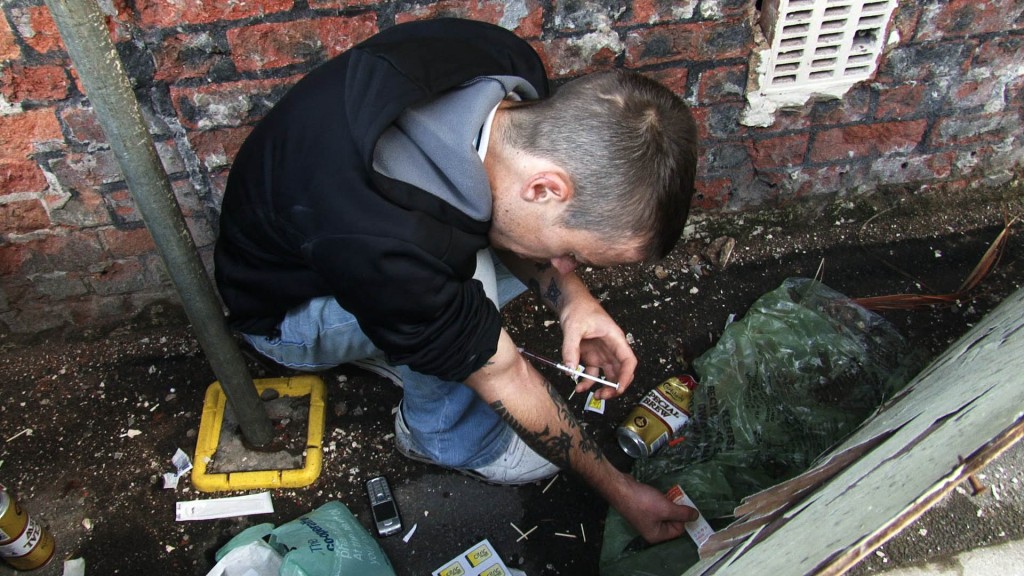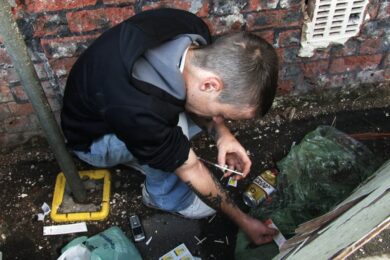Over a period of six months filming Swansea’s drug-addicted youth, Leo Leigh (son of British auteur, Mike) and Andy Capper, UK Editor of Vice, have managed to discover some intriguing characters. Notably, Amy and Cornelius, a pair of habitual heroin users with a penchant for street drinking who provide the basis for the film’s love story. However it is hard to get past their appalling biography and the vicious circle that has become their existence, and really appreciate that there is a romance of sorts going on. Our first introduction to them is a conversation in which it feels like they are competing with each other as to who started taking drugs first. (The winning age being 11.) And then on to whose life is more traumatic. (Amy was homeless at 12, but Cornelius was dealing drugs with his father at 16.) If the viewer finds their sympathy levels low at this point then they should brace themselves for what is to come.
Swansea Love Story is primarily about the effects on those growing up in the aftermath of the Welsh city’s decline in industry, as the opening titles state: "In the last four years the small South Wales city of Swansea registered a 180 percent increase of heroin users. Young people made up the bulk of the increase."
The filmmakers not only capture the lives of Swansea’s drug addicts and alcoholics but also seek opinions on the situation from the elderly and those – even by the standards of this documentary – too young to be hard drug users.
For some reason the filmmakers decide to visit what appears to be a Goth strip club, and interview some of the girls there, probably to highlight the lack of career options available for young women in Swansea. So far, so Vice. But the scene bears no real relevance to the rest of the film and comes over as an indulgent excuse to include a few scantily clad girls who otherwise wouldn’t have featured.
There is an interesting scene when two young boys set out their views not just on the drug problem in their neighbourhood but also on immigration and race. Moments of humour (albeit of the dark variety) pop up like beacons amidst the bleakness of the film, providing some genuinely amusing moments. Andrew’s advice on how not to go cold turkey being of note. All of which combined with the few tales of those who have successfully managed to stop taking class-A drugs and appear to be getting their lives back, enable the viewer to emphasise with people who at first seem irrevocably estranged from society.
Leigh and Capper have done an admirable job of capturing their subjects in a suitably non-invasive and respectful manner. Obviously it’s arguable that you need to see people using drugs and hear about how they use them in order to gain an understanding of their lives. But it does make for disturbing viewing, which is of course to be expected given its pedigree.
I can’t help but think that a film of this nature would have benefited from distancing itself from the Vice brand as the connection doesn’t initially inspire confidence that the film will attempt to expose and educate rather than exploit. In comparison Duane Hopkins’ Better Things, a fictional portrayal of the reality of disenfranchised youth in dead-end towns, is unrestrained by the conventions of documentary filmmaking, enabling it to portray a more useful sense of the anguish and hopelessness felt by people in this position.
Here, these harsh realities are just laid bare.
One teenager discusses the fact that she has been forced into prostitution at the age of 12 by a mother that she has slept with – a particularly lurid moment in which she describes her mother’s genitals. This simply shocks and alienates.
Music from the Dunvant Male Voice Choir, adds some gravitas by evoking a bygone Swansea when people’s lives were just as hard but as yet unscarred by the effects of narcotics. The choir also emphasises the fact that underneath the images of drug abuse and tales of poverty there is an underlying message of hope and the importance of not ignoring the plight of the less fortunate.
As a local man states during a Welsh Defence League Rally, complete with Nazi saluting fascists that "Swansea . . . is a good town. As long as everybody gets on. If you don’t get on, well you can’t make it can you?"



